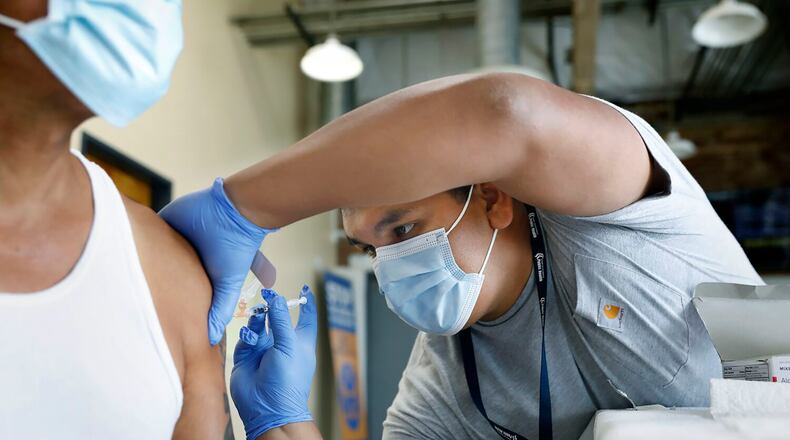With COVID cases rising, many are asking when they should get their next booster.
Experts say most people should wait for the updated vaccine, expected to arrive at pharmacies and doctor’s offices around mid-September.
Those at high risk of infection or those who haven’t had a booster or infection for several months should ask their doctor’s advice. Plans for travel or a family gathering may also play into a decision to get boosted now rather than waiting.
But for most people, it makes sense to wait for a vaccine that will better target the variants now circulating, according to public health experts, including Jodie Guest, senior vice chair of the Department of Epidemiology at Emory’s Rollins School of Public Health and Dr. Felipe Lobelo, an epidemiologist at Kaiser Permanente of Georgia.
Dr. Scott Roberts, a Yale Medicine infectious diseases specialist said the new booster won’t be an exact match for the variant that now accounts for the largest share of COVID cases in Georgia and the U.S. — an omicron offshoot known as EG.5. The vaccine formula was designed earlier this year to match a different omicron variant. However, the big vaccine manufacturers Pfizer, Moderna and Novavax have announced early clinical trials show the shot will be effective against these latest variants.
The coronavirus has proven slippery to pin down, throwing out a rogue’s gallery of mutations that makes it hard to know where to aim the next vaccine. The vaccine that will arrive in September was designed to match XBB.1.5, which now is estimated to account for fewer than 5% of COVID cases in the U.S., according to the Centers for Disease Control and Prevention’s variant tracker.
“The two strains, EG.5 and XBB.1.5, are not identical, but they’re pretty close,” said Roberts said in an article published on Yale Medicine news, “My strong suspicion is that, given the genetic similarities, there will still be a good degree of protection from the booster.”
In the meantime, public health experts say if you are concerned about catching COVID, you can take elevated precautions such as wearing an N95 or KN95 mask or avoiding crowds until the new updated vaccine is available.
“We know there is a lot of COVID-19 right now in communities and if you are at high risk for complications from COVID-19, it would be wise to be careful as you wait for the new vaccines,” Guest said in an e-mail.
Lobelo agrees.
“Being careful over the next few weeks is certainly warranted,” he said, especially for those who are over the age of 65 and others at high risk of severe illness from COVID.
Credit: Katelyn Myrick
Credit: Katelyn Myrick
Federal health officials are shifting to an annual model for COVID shots for all age groups, similar to flu shots. Proponents say an annual shot could simplify the process of staying vaccinated and protected against severe COVID.
Guest noted it’s perfectly fine to get the updated COVID booster and the flu shot at the same time. She said the timing of getting these vaccines next month is also good because people will be protected for the flu season and during the winter months when COVID cases tend to rise. Ideally, people should get vaccinated against the flu before the flu begins to spread, making September or October the ideal vaccination time.
In addition to the updated COVID vaccines, a new vaccine for Respiratory Syncytial Virus (RSV) is available this fall for those age 60 and over and at risk for the respiratory virus. These new vaccines are the first ones licensed in the U.S. to protect against RSV, which CDC estimates causes approximately 6,000–10,000 deaths among older adults every year.
For those who are over 60 and eligible for an RSV vaccine, Guest said the recommendation is to separate it by a few weeks from the COVID and flu vaccines to avoid potential side effects.
About the Author
Keep Reading
The Latest
Featured



